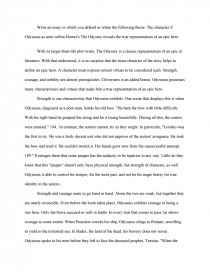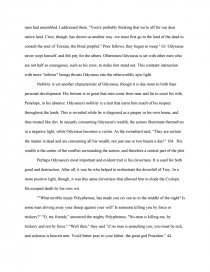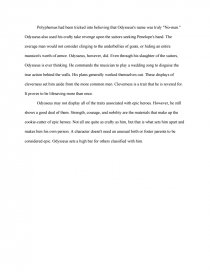The Odyssey
Essay by review • February 3, 2011 • Essay • 958 Words (4 Pages) • 1,693 Views
Write an essay in which you defend or refute the following thesis: The character if Odysseus as seen within Homer's The Odyssey reveals the true representation of an epic hero.
With its larger-than-life plot twists, The Odyssey is a classic representation of an epic in literature. With that understood, it is no surprise that the main character of the story helps to define an epic hero. A character must express certain virtues to be considered such. Strength, courage, and nobility are almost prerequisites. Cleverness is an added bonus. Odysseus possesses many characteristics and virtues that make him a true representation of an epic hero.
Strength is one characteristic that Odysseus exhibits. One scene that displays this is when Odysseus, disguised as a poor man, bends his old bow. "He bent the bow with little difficulty. With his right hand he grasped the string and let it twang beautifully. During all this, the suitors were amazed." 194. In contrast, the suitors cannot, try as they might. In particular, "Leiodes was the first to try. He was a fairly decent sort who did not approve of the suitors' arrogance. He took the bow and tried it. He couldn't stretch it. His hands grew sore from the unsuccessful attempt. 189." It enrages them that some pauper has the audacity to be superior in any way. Little do they know that this "pauper" doesn't only have physical strength, but strength of character, as well. Odysseus is able to control his temper, for the most part, and not let his anger betray his true identity to the suitors.
Strength and courage seem to go hand in hand. Alone the two are weak, but together they are nearly invincible. Even before the book takes place, Odysseus exhibits courage in being a war hero. Only the brave succeed so well in battle. In every trial that comes to pass, he shows courage to some extent. When Poseidon wrecks his ship, Odysseus clings to flotsam, unwilling to yield to the torrential sea. In Hades, the land of the dead, his bravery does not waver. Odysseus spoke to his men before they left to face the deceased prophet, Tiresias. "When the men had assembled, I addressed them. "You're probably thinking that we're off for our dear native land. Circe, though, has shown us another way -we must first go to the land of the dead to consult the soul of Tiresias, the blind prophet." Poor fellows, they began to weep." 63. Odysseus never wept himself, and felt pity for the others. Oftentimes Odysseus is set with other men who are not half so courageous, such as his crew, to make him stand out. This constant interaction with more "inferior" beings thrusts Odysseus into the otherworldly epic light.
Nobility is yet another characteristic of Odysseus, though it is due more to birth than personal development. His fortune is so great that men come from near and far to court his wife, Penelope, in his absence. Odysseus's nobility is a trait that earns him much of his respect throughout the lands. This is revealed while he is disguised as a pauper in his own house, and thus treated like dirt. In unjustly consuming Odysseus's wealth, the suitors illuminate themselves in a negative light, while Odysseus becomes a victim. As the swineherd said, "They are certain the master is dead and
...
...


